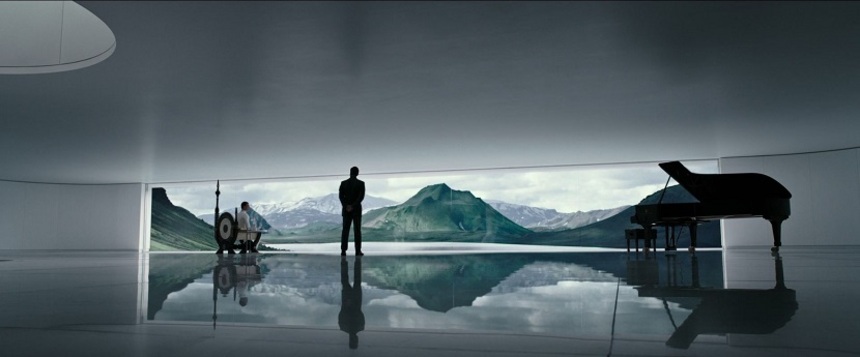Review: ALIEN: COVENANT Uses Horror to Mask Its Shortcomings
Katherine Waterston, Billy Crudup, and Michael Fassbender star in Ridley Scott's horror prequel.

Ridley Scott returns to fill in the blanks of the maligned horrors of space, with plenty of screaming and more than enough people around to hear it in Alien: Covenant.
His familiar fated take on the Alien genesis, however, sticks more in-line with the A.I. powered philosophy of the first prequel Prometheus. Despite trying to return to the uncanny feminist allegory / creature-feature roots of the action-horror original, the results are instead long-winded diatribes about what it means to create monsters, and the same type of illogical reasoning of the living crew that dented the first film. Thankfully there are aliens this time around, and not the lame hybrid creature type, either, as these are drawn straight from Giger’s masterful creations and provide visceral and unexpected violence as they hunt and stalk the crew.
Ten years after the events of the fated research exploration in Prometheus, this new journey is one of colonization, imbued with the lives of over two thousand souls in solitary sleeping pods on the spaceship called The Covenant. The word covenant actually describes a restrictive law; further to this and keeping with the film’s haughty rhetoric it is also a formal agreement between God (the creator) and a community or humanity in general.
The sci-fi trappings of space danger are inherent from the film’s opening moments. At first it echoes Prometheus as the android Walter (played by Michael Fassbender) potters about the ship ensuring everything is running smoothly and the humans are safe. He constantly reports to ‘Mother’, the ship's AI.
Moments later, however, and The Covenant is put into immediate danger. The Captain, who is bizarrely played by James Franco with next to no screen-time, perishes in his hibernation pod as a fire breaks out. The actual crew then awakens early. Overcome by grief and confusion they patch up the ship quickly.
The Captain’s partner is the new Ripley; Daniels (Katherine Waterson). She is logical, quick-thinking and forms a strong and logical argument about what they have just found. After the disaster and loss, the sensors detect a completely hospitable planet, and although their destination is a lot further away, the former adjunct crew member, now Captain Oram (Billy Crudup) makes the rash decision to land there and set up the new world. Daniels argues with Oram that maybe something that is too good to be true actually isn’t, but she is drowned out by faith as their quasi-religious, unconfident leader makes the decision anyway.
What follows is a crescendo of really bad decisions and genuinely appalling logic when they do land, ranging from poor quarantine measures, literally pissing on the flora and fauna of a brand-new planet, trusting something found milling about near the severed head of your fallen comrade, risking two thousand lives to help a few, and looking directly into a sinister overly-large and familiar egg. It's the kind of painful Deus Ex Machina decisions that echo the insipid script of the first prequel and the way the “scientists” in that film handled their first contact.
Amidst these decisions are the remaining crew trying to piece together how to survive and leave as an android outsmarts and outclasses them with unknown intent and purpose. The writing is literally on the wall, though, as Daniels and company discover a grotto filled with answers, and admittedly their startled responses and ill-timed excursion make way for some fantastic and thrilling horror sequences.
The alien is animated perfectly, moving swiftly and stealthily, each time it is on-screen it is genuinely terrifying in the way it uses its speed and brutality. Another certain horror element stems from the incubation, as fan favourite face-huggers return to impregnate relentless terror through chest and spine bursting scenes that hold nothing back.
This gore immediately recalls the uncanny horror that made the original Alien so powerful. These scenes ground the hopelessness in the survivors and pervades the screen with dread, leaving no time to ponder what has happened as the next victim is immediately sought. The action scenes also provide a fresh tempo as the wit and desperation of Daniels in particular provide the same exciting ingenuity and pacing of James Cameron’s sequel effort with Aliens. Ultimately, both the horrific violence and impactful action scenes feel far too brief amidst the android ramblings.
Alien: Covenant is an at-times cliché sci-fi and horror effort burdened by its unnecessary over-explanation of what the aliens actually are, where they came from and the purpose of this horrible madness. Relentlessly nihilistic in its approach, Alien: Covenant actually dims the uncanny horror and thought-provoking feminist slant of ‘the other’ that defined the franchise. In trying to ask and answer the big questions, both this and the disappointing prequel Prometheus dilute the genuine unknown and terrifying horror that drives it.







